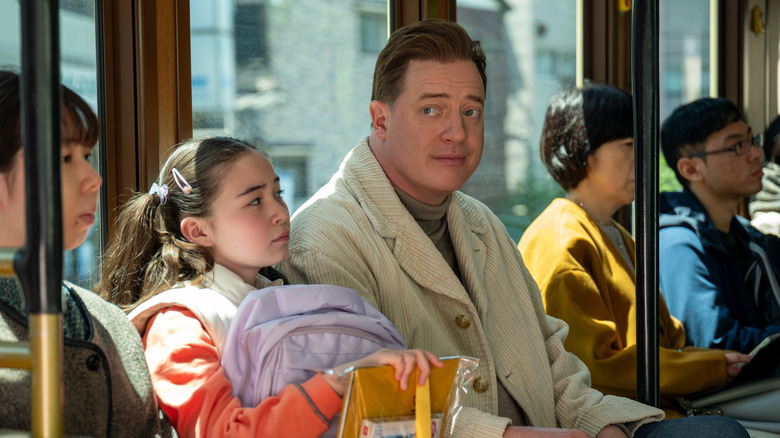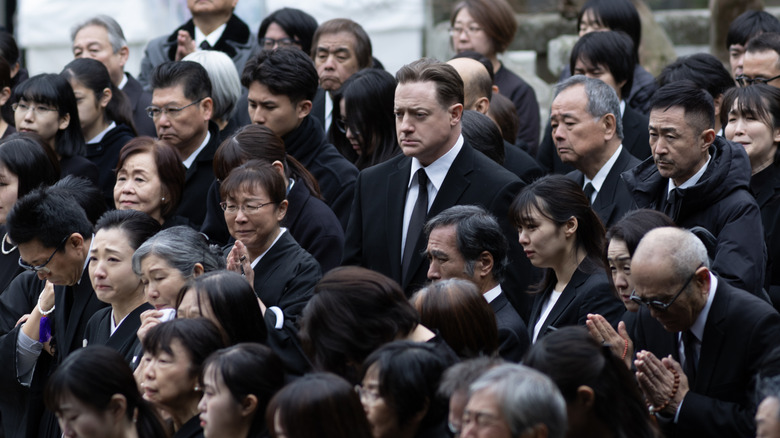Rental Family Review: An Earnest And Sentimental Crowdpleaser [TIFF 2025]
- Endearing performance from Brendan Fraser
- Moving examination of loneliness and found families
- Can verge on overly sentimental at times
In a world where families are flung further across the globe than ever before and the notion of a community has become increasingly rare, people are starved for the kind of relationships we used to take for granted as being utterly essential. Hikari's "Rental Family" is an earnest and sentimental exploration of loneliness and the longing for human connection. How much you buy into that sentiment will undoubtedly vary from person to person — some may see it as moving while others will find it emotionally manipulative, and indeed it does straddle that line with reckless abandon.
Philip (Brendan Fraser) is a middle-aged actor living in Tokyo, rushing from audition to audition to try to gain a foothold in the Japanese entertainment industry. One day, the owner of Rental Family reaches out to him, hoping that Philip will join their team of performers. But unlike a film or television project, the work that they do is much less structured. In effect, they act out long-form improv, helping to craft an illusion out of reality for their clients. One has Philip pretend to be a journalist sent to interview their aging father so that he feels that someone is interested in his legacy, for example, while another has him pose as the groom at their fictional wedding. But the gig that causes the most heartache is when he's asked to play the role of the absentee father of young Mia to help her get into an ultra-competitive private school — a lie that takes on a life of its own as Philip and Mia begin to connect and form a genuine father-daughter bond with each other.
Tokyo, isolation, and Japanese culture
For the purposes of this story, the setting of Tokyo as an epicenter of isolation is particularly apt, especially for someone like Philip. While he's a large presence on screen, ambling through urban landscapes he seems too tall for, he's also anonymous. The roles he auditions for are things like "Sad American," and when he's hired by Rental Family, it's as a token white man. In Tokyo, he can be surrounded by people at all times and still be utterly alone. He's constantly reminded of his status as an outsider — when he questions the process of Rental Family, he's told that as a foreigner, he can't really understand the nuances of Japanese culture that make such a service attractive.
And indeed, this entire idea of hiring a company to provide elaborate fantasies in the place of relationships with direct communication is deeply rooted in Japanese culture. The impulse to avoid directly confronting anything ugly or unconventional, to avoid rocking the boat, is a hard one to overcome. And where going to therapy is often stigmatized as an unpleasant weakness, there are fewer outlets available for people to learn to address their issues head on. It's clear that although there are uses for the Rental Family model that can be seen as therapeutic, there are also plenty of situations where it does more harm than good — as we see in the relationship between Philip and Mia, predicated on a lie.
The uncynical star power of Brendan Fraser
Brendan Fraser, a performer who has experienced his own rollercoaster ride of a career, is the perfect actor to helm "Rental Family." He has an earnestness that makes it clear that he's always going forward with the best of intentions, and a vulnerability that sells the loneliness and isolation of his character. If there was a hint of cynicism or irony to Philip, none of this would work. But his understated, soft-spoken performance lends the character a lot of emotional depth.
And this film tugs at the heartstrings, make no mistake. Throughout the runtime of "Rental Family," it plays the audience like a fiddle, using all the familiar pressure points to elicit a reaction. Whether or not all of these emotional beats are organic or indeed earned is another question entirely. Plenty of situations feel contrived to get us to maximum emotional impact, regardless of whether or not they actually make sense within the narrative. The film is at its strongest in its quieter moments, when we're able to bask in Philip's personal growth. He goes from being a mere observer of other people's lives (he spends a great deal of time at his window, watching his neighbors as though they were picture-in-picture television), to acting but only within the rigidly defined strictures of his given role, to finally becoming an active participant in his own life. He matters beyond just the space that he can fill for others, but because of who he is as a person.
It's hard to fault any of the performances in "Rental Family," particularly what we get from Mari Yamamoto as Philip's tough on the outside, soft on the inside colleague and Akira Emoto as his would-be daughter Mia. I only wish that these relationships had a little bit more time to breathe, since the film often feels overstuffed with narrative subplots. We're barely given a second to sit with these burgeoning friendships when we're rushed along to the next plot point. Still, "Rental Family" is a clear crowdpleaser with a sense of humor and charm that will make audiences fall in love with it — if they're willing to accept its unvarnished sentimentality, that is.
"Rental Family" premiered at the Toronto International Film Festival, and will hit theaters on November 21.


